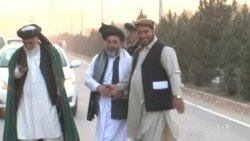KABUL —
More than 2,000 Afghan tribal and community elders soon will decide on an agreement that determines whether any U.S. forces will remain in the country after 2014. The tribal assembly has high stakes for Afghanistan’s future.
Tribal and community elders from around Afghanistan have started arriving in Kabul to determine details of a security pact with the United States.
Security is tight around the capital. During the weekend a bomb exploded 500 meters from the site of the gathering, a stark reminder of the ongoing militant threat in the country.
Such concerns about security, as well as Afghan suspicions of neighbors Pakistan and Iran, have lawmakers, like Salih Mohammad Salih, backing the security agreement.
“We need to make sure the bilateral security agreement includes language that if any country attacks or interferes on our soil, the United States will support our national army and security forces in pushing back,” said Salih.
Loya Jirga approval needed
Afghanistan President Hamid Karzai has negotiated a draft agreement with U.S. officials. But the tribal assembly, or Loya Jirga, must give its approval before the document goes to the Afghanistan Parliament for a vote.
Among the most contentious points is whether U.S. troops or contractors will be tried in Afghan courts or American courts for any wrongdoing after the end of 2014.
The Taliban has threatened leaders who support the deal. And former mujahedeen and conservative religious groups are opposed. They say the accord would “sell” Afghanistan to Washington.
Different opinions
Opinion on the street is divided. Some want the Americans to leave, others say a security pact is important.
Abdul Ali Sultani of western Farah province supports a deal. “I think that without an agreement, you will soon see the Taliban, Pakistan intelligence and Iran intelligence at the doors of Kabul.”
The country cannot afford to turn down the security pact, cautions lawmaker Haji Mirdad Khan Nijrabi. “The U.S. has promised to pay $4.1 billion to our security forces, and another $4 billion to our civilian institutions. If this Loya Jirga advises the government to reject the agreement, we are in danger of losing this aid,” he said.
For the United States, a continued presence in Afghanistan will give Washington time to improve the capacity of the Afghan security forces, as well as ensure that al-Qaida does not once again gain a foothold in the country.
Tribal and community elders from around Afghanistan have started arriving in Kabul to determine details of a security pact with the United States.
Security is tight around the capital. During the weekend a bomb exploded 500 meters from the site of the gathering, a stark reminder of the ongoing militant threat in the country.
Such concerns about security, as well as Afghan suspicions of neighbors Pakistan and Iran, have lawmakers, like Salih Mohammad Salih, backing the security agreement.
“We need to make sure the bilateral security agreement includes language that if any country attacks or interferes on our soil, the United States will support our national army and security forces in pushing back,” said Salih.
Loya Jirga approval needed
Afghanistan President Hamid Karzai has negotiated a draft agreement with U.S. officials. But the tribal assembly, or Loya Jirga, must give its approval before the document goes to the Afghanistan Parliament for a vote.
Among the most contentious points is whether U.S. troops or contractors will be tried in Afghan courts or American courts for any wrongdoing after the end of 2014.
The Taliban has threatened leaders who support the deal. And former mujahedeen and conservative religious groups are opposed. They say the accord would “sell” Afghanistan to Washington.
Different opinions
Opinion on the street is divided. Some want the Americans to leave, others say a security pact is important.
Abdul Ali Sultani of western Farah province supports a deal. “I think that without an agreement, you will soon see the Taliban, Pakistan intelligence and Iran intelligence at the doors of Kabul.”
The country cannot afford to turn down the security pact, cautions lawmaker Haji Mirdad Khan Nijrabi. “The U.S. has promised to pay $4.1 billion to our security forces, and another $4 billion to our civilian institutions. If this Loya Jirga advises the government to reject the agreement, we are in danger of losing this aid,” he said.
For the United States, a continued presence in Afghanistan will give Washington time to improve the capacity of the Afghan security forces, as well as ensure that al-Qaida does not once again gain a foothold in the country.













